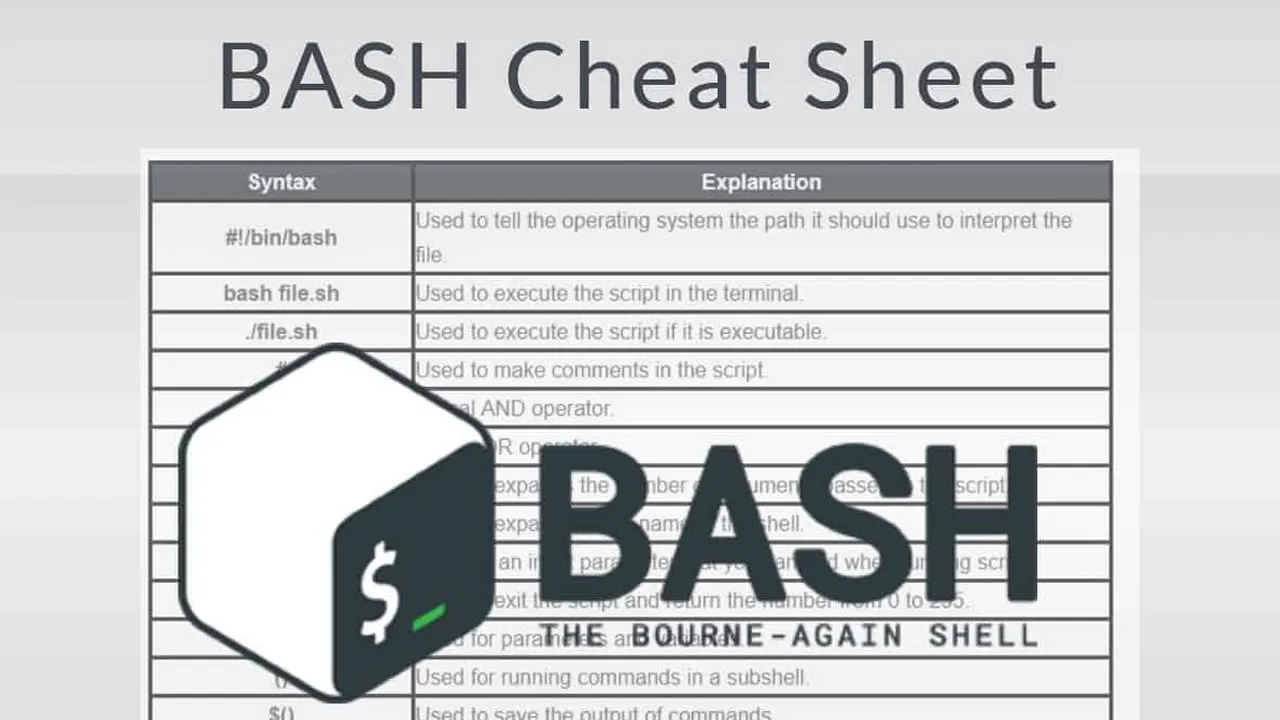BASH CheatSheet: Learn the Most Common BASH Commands
Master BASH with this comprehensive cheatsheet for beginners! Learn the most common BASH commands. This comprehensive BASH cheatsheet for beginners is the perfect resource for anyone who wants to learn the most common BASH commands quickly and easily. Covering a wide range of topics, from basic file management to advanced scripting, this cheatsheet has everything you need to start using BASH effectively.
Whether you're a complete beginner or you have some basic BASH knowledge, this cheatsheet is a must-have for anyone who wants to learn the most common BASH commands.
Commands
tr command
Remove whitespace:
$ echo 'foo - bar' | tr -d '[:space:]'
foo-bar
Convert to uppercase:
$ echo 'HeLLo' | tr '[:lower:]' '[:upper:]'
HELLO
One Liners
Block Bad IPs
Use iptables to block all bad ip addresses:
$ cat /var/log/maillog | grep 'lost connection after AUTH from unknown' | tail -n 5
May 10 11:19:49 srv4 postfix/smtpd[1486]: lost connection after AUTH from unknown[185.36.81.145]
May 10 11:21:41 srv4 postfix/smtpd[1762]: lost connection after AUTH from unknown[185.36.81.164]
May 10 11:21:56 srv4 postfix/smtpd[1762]: lost connection after AUTH from unknown[175.139.231.129]
May 10 11:23:51 srv4 postfix/smtpd[1838]: lost connection after AUTH from unknown[185.211.245.170]
May 10 11:24:02 srv4 postfix/smtpd[1838]: lost connection after AUTH from unknown[185.211.245.170]
Get the data to show only IPs:
cat /var/log/maillog | grep 'lost connection after AUTH from unknown' | cut -d'[' -f3 | cut -d ']' -f1 | tail -n5
185.36.81.164
175.139.231.129
185.211.245.170
185.211.245.170
185.36.81.173
Get the uniqe IP addresses:
$ cat /var/log/maillog | grep 'lost connection after AUTH from unknown' | cut -d'[' -f3 | cut -d ']' -f1 | sort | uniq
103.194.70.16
112.196.77.202
113.172.210.19
113.173.182.119
139.59.224.234
Redirect the output to iptables:
$ for ip in $(cat /var/log/maillog | grep 'lost connection after AUTH from unknown' | cut -d'[' -f3 | cut -d ']' -f1 | sort | uniq); do iptables -I INPUT -s ${ip} -p tcp --dport 25 -j DROP; done
If Statements
Check if args are passed
if [[ $# -eq 0 ]] ; then
echo 'need to pass args'
exit 0
fi
Check if required variables exist
if [ $1 == "one" ] || [ $1 == "two" ]
then
echo "argument 1 has the value one or two"
exit 0
else
echo "I require argument 1 to be one or two"
exit 1
fi
OR
NAME=${1}
if [ -z ${NAME} ]
then
echo NAME is undefined
exit 1
else
echo "Hi ${NAME}"
fi
Check if environment variables exists
if [ -z ${OWNER} ] || [ -z ${NAME} ]
then
echo "does not meet requirements of both environment variables"
exit 1
else
echo "required environment variables exists"
fi
While Loops
Run process for 5 Seconds
set -ex
count=0
echo "boot"
ping localhost &
while [ $count -le 5 ]
do
sleep 1
count=$((count + 1))
echo $count
done
ps aux | grep ping
echo "tear down"
kill $!
sleep 2
Run until state changes within ttl
UPDATE_COMPLETE=false
UPDATE_STATUS=running
COUNT=0
while [ ${UPDATE_COMPLETE} == false ]
do
if [ $count -gt 10 ]
then
echo "timed out"
exit 1
fi
if [ ${UPDATE_STATUS} == running ]
then
echo "still running"
sleep 1
COUNT=$((COUNT+1))
if [ $count == 7 ]
then
UPDATE_COMPLETE=true
fi
elif [ ${UPDATE_STATUS} == successful ]
then
UPDATE_COMPLETE=successful
else
echo "unexpected update response"
exit 1
fi
done
echo "complete"
for Loops
Upload all docker image
for i in $(ls | grep .tar): do
docker load -i $i;
done
Functions
message(){
NAME=${1}
echo "Hi ${NAME}"
}
OR pass all args:
message(){
echo "Hi $@"
}
Redirecting Outputs
Stdout, Stderr
Redirect stderr to /dev/null:
grep -irl faker . 2>/dev/null
Redirect stdout to one file and stderr to another file:
grep -irl faker . > out 2>error
Redirect stderr to stdout (&1), and then redirect stdout to a file:
grep -irl faker . >out 2>&1
Redirect both to a file:
grep -irl faker . &> file.log
Manipulating Text
Remove first 3 characters
$ STRING="abcdefghij"
$ echo ${STRING:3}
defghij
Only show last 3 characters
With tail to only show the last 3 characters:
$ STRING="abcdefghij"
$ echo ${STRING} | tail -c 4
hij#bash #linux
